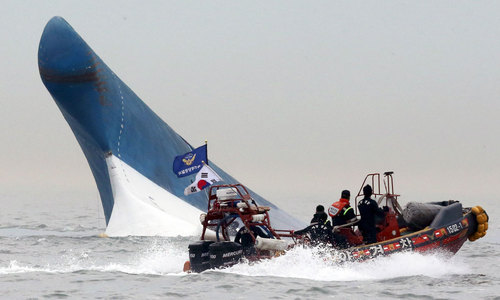NEARLY 300 people are feared missing after a huge ferry capsized and sank off South Korea’s southwestern coast. Carrying a group of high school students on a field trip from a high school outside Seoul, the ship was en route to Jeju, a Korean resort island known as the country’s “Hawaii”.
Scores of rescue divers have descended on the ship, and it is feared that the death toll will rise sharply in coming days. Survivors say many people remain trapped on the ship’s lower decks; 462 people were on board the ship, 281 of whom remain unaccounted for.
Between 800 and 1,000 people are thought to die in ferry accidents every year, according to Roberta Weisbrod, the executive director of the Worldwide Ferry Safety Association. While ferries in the developed world are by and large very safe, ferry safety is a serious problem in the developing world, Weisbrod said. But the true extent of the problem remains something of a mystery: the actual annual death toll from ferry disasters could be twice the current estimate, she says.
While ferry accidents such as this week’s catastrophe are uncommon in Korea — its last such disaster came two decades ago — they happen more often elsewhere in Asia, particularly in Bangladesh, the Philippines and Indonesia.
The Philippines and Indonesia are composed of extensive archipelagos; Bangladesh is a riverine country. As a result, water transport is a fact of daily life. What has been described as the world’s worst peacetime maritime tragedy occurred in the Philippines in 1987 when the Dona Paz collided with an oil tanker and as many as 4,000 people lost their lives.
Ferries in developing countries are often old vessels, sometimes repurposed to operate in waterways for which they weren’t designed. In Tanzania, for example, ferries from the calm waters of Washington state’s Puget Sound were put to sea in the rough waters of the Indian Ocean, Weisbrod said.
Ferries in the developing world are often overcrowded, which can throw off a boat’s balance or make it top heavy and more prone to capsizing. And when crew members are inadequately trained they are uncertain of how to respond in the event of a disaster, exacerbating these problems. Moreover, government safety regulations are far less stringent — or go unenforced — in developing nations.
While it’s difficult to draw a common thread through different ferry accidents, Weisbrod says extreme or unexpected weather events typically precede a catastrophic ferry accident. Indeed, in this week’s capsizing and sinking of South Korean ferry, local media reported that the ship may have hit rocks in heavy fog. “The boat suddenly stopped after a big thumping sound from the frontal part of the ship,” one passenger told a local TV station.
Weisbrod says there is some reason for optimism in improving ferry safety in the developing world. Together with the International Maritime Organization, Interferry, a group representing the global ferry industry, has launched an initiative to drastically reduce fatalities. So far, they’ve brought together safety officials to share best practices and have launched a competition to design safer vessels.
Of course, many of the factors that make ferry accidents routine in parts of the developing world were not at play in the case of the Sewol. The ship wasn’t overcrowded, and there is, at least at this stage, little reason to doubt the seaworthiness of the vessel.
That only serves to magnify the horror of the disaster. “It’s a betrayal of a wonderful way of travelling —so many helpless people,” Weisbrod said.
—By arrangement with Foreign Policy-The Washington PostNewspaperInternationalLatest













































